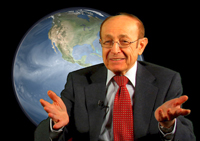
On March 23, 2011, the Aqua team and the broader NASA Earth-observing program suffered a devastating loss, when the AIRS Science Team leader Moustafa Chahine passed away unexpectedly, apparently from a heart attack several hours after what had seemed to be a successful surgery. Mous was the key individual behind the phenomenal AIRS instrument on Aqua and was the guiding force behind many major successes of the AIRS Science Team. He was the AIRS Team Leader and a vital part of the Aqua community since the early 1990s. His many kindnesses and gung-ho enthusiasm about science are well remembered; and his presence is sorely missed.
For more about Mous and his career, see http://airs.jpl.nasa.gov/news/92
Moustafa Chahine was awarded a Ph.D. in Fluid Physics from the University of California at Berkeley in 1960. He is Chief Scientist at the Jet Propulsion Laboratory (JPL), where he has been affiliated for 30 years. From 1978 to 1984, he was Manager of the Division of Earth and Space Sciences at JPL; as such, he was responsible for establishing the Division and managing the diverse activities of its 400 researchers.
For 20 years, Dr. Chahine has been directly involved in remote sensing theory and experiments. His resume reflects roles as Principal Investigator, designer and developer, and analyst in remote-sensing experiments. He developed the Physical Relaxation Method for retrieving atmospheric profiles from radiance observations. Subsequently, he formulated a multispectral approach using infrared and microwave data for remote sensing in the presence of clouds. These data analysis techniques were successfully applied in 1980 to produce the first global distribution of the Earth surface temperature using data from the HIRS/MSU sounders.
Dr. Chahine was integrally involved in the AMTS study, which laid the basis for the current AIRS spectrometer. Dr. Chahine served as a member of the NASA Earth System Sciences Committee (ESSC), which developed the program leading to EOS, and currently is Chairman of the Science Steering Group of a closely related effort, the World Meteorological Organization’s Global Energy and Water Cycle Experiment (GEWEX). Dr. Chahine is a Fellow of the American Physical Society and the British Meteorological Society. In 1969, he was awarded the NASA Medal for Exceptional Scientific Achievement and, in 1984, the NASA Outstanding Leadership Medal.
